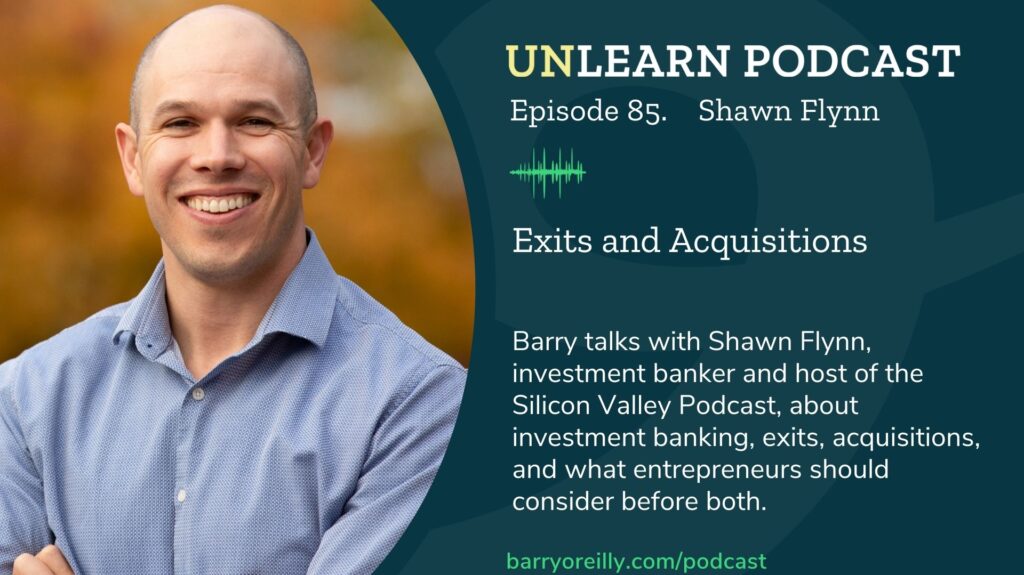Shawn Flynn started his career in Beijing, China, by founding, scaling, and successfully exiting a company. He is now the Principal of a premier middle market investment bank specializing in mergers and acquisitions, capital markets, financial restructuring, and valuation. He is also host of The Silicon Valley Podcast. In this episode of Unlearn, he and Barry O’Reilly talk about exits and acquisitions.
Intro to investment banking
Unlike most people in the profession, Shawn did not have an undergrad economics degree, MBA, or a jam-packed resume. He was overseas for roughly 8 years after graduating from college with a mechanical engineering degree, seizing the opportunity to travel to Costa Rica, China, Europe, and back to China, where he started a few companies. One of them did well, and the others were learning experiences. After returning to the States in 2013, he got a job as an account executive for a company that unfortunately folded, but through that experience, he was able to meet and network with many angel investors and one group who eventually took him under their wing. He became the investment director for the second oldest angel group in Silicon Valley. [Listen from 2:17]

Debunking misconceptions
The real work in investment banking is client-facing – keeping conversations and engagement going, making people feel comfortable, and asking the necessary questions so there’s no skeletons in the closet about the company. “The people skill is so huge in this line of work and I had no idea going into it,” Shawn confesses. “I thought if you were good at Excel, you’re a good investment banker, but in reality anyone can do that. The real skill is finding the deals, being able to build that rapport and keep everyone engaged through the entire process.” Barry and Shawn discuss what’s involved in the exit process and getting acquired, and what founders should consider before both. You should be talking to a wealth advisor and tax strategist an entire year before you want to exit, Shawn shares. Clearly identify your goals with them, so you can figure out the exit valuation range of your company. “When you build a company in anticipation to sell it, you actually build a better company,” he adds. [Listen from 8:21]
(Listen to the previous podcast “Building Developer Platforms & Working with Mentors” with Kaspar von Grünberg)
Open door policies
When planning an exit, you actually want employees to not have heard from you or contact you with urgent news in months. That’s a sign that things can and are operating smoothly without you – exactly what you need when exiting. Everyone knows their KPIs, the systems they’re running and how to get there, and what they’re doing every quarter. You want the people at the top to be able to go for vacation any time they want and not have the company destroy itself. Barry asks how transparency, or a lack thereof, can affect selling or acquiring a company. Many executives enter the market without the anticipation of actually selling, and are just testing the waters to gain feedback, Shawn claims. In Silicon Valley, not keeping it secret that you want to sell often does more harm than good – too much uncertainty can make it easy for other companies to poach your employees, and vendors can get wary. [Listen from 15:39]
(Listen to the previous podcast about “Making Data Awesome” with Sara Michelazzo)
Time is of the essence
Time kills all deals, Barry says. At Nobody Studios, they value getting things done in a timely fashion. Stall too long, and you are very likely to lose the deal altogether. Anything can happen, Shawn comments. Keep pressing the deal forward, when momentum slows down or there is a break, parties might loose interest or something else shiny may come along that grabs attention. Even for a moment could kill the deal. You need to maximize the moment when it feels good for everybody involved. Barry shares his experience with time and acquisitions. [Listen from 23:34]
An emotional process
Having an outside advisor during the selling process is invaluable, because they prepare you for everything – and preparation is something you will need, as exiting tends to be quite emotional. Building a company can consume much of your life, and letting go can get complicated, even when selling has been the plan all along. When potential acquirers come asking questions and trying to understand some of the decisions you’ve made, it’s easy to feel like they’re attacking you. Then, when it’s time to go out to market and you get no response after a few days, it’s disheartening. There are many ups and downs in this process that outside advisors can help you through, since they have a certain degree of separation from you and your company. [Listen from 27:45]
Looking forward
Shawn is looking forward to resuming in-person events, like the half-day summit he held recently. He’s also excited about collaborating with foreign companies interested in setting up operations in the US. “People have had all these dreams built up for the last 2 years, and now they’re sharing them with the world and saying ‘I gotta catch up on 2 years of stuff, let’s move fast,’” he adds. [Listen from 39:01]















